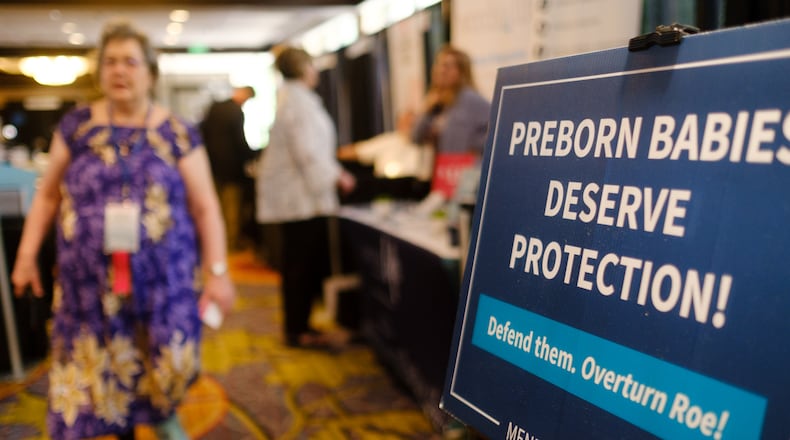The fate of Georgia’s abortion law is in the hands of a Fulton County judge after two days of emotional testimony from experts arguing why the statute should or shouldn’t remain on the books.
Fulton County Superior Court Judge Robert McBurney told the attorneys involved in the case that he did not expect to issue a decision until after the Nov. 8 election. Any ruling by McBurney will likely be appealed.
A ruling from the 11th U.S. Circuit Court of Appeals in July allowed Georgia’s 2019 abortion law to be enforced. That means most abortions are no longer allowed once a doctor can detect fetal cardiac activity, typically about six weeks into a pregnancy and before many women know they are pregnant.
A June decision by the U.S. Supreme Court overturned Roe v. Wade, the 1973 ruling that guaranteed a nationwide right to abortion, paving the way for Georgia’s law to take effect.
McBurney scheduled the two-day trial to hear arguments from abortion rights supporters who want him to block the new restrictions, saying that they violate a woman’s right to privacy under the state constitution.
Attorneys for the abortion rights providers also argued that when the law passed in 2019, Roe v. Wade was the law of the land and state law does not allow the Legislature to enact statutes that violate the law.
State lawyers contend the law should remain in effect because “abortion always harms a third party,” the embryo or fetus.
At the end of the trial Tuesday, McBurney, said, “The subject matter with which we are dealing sometimes lends itself to shrillness and we have not had that, which is good. We’ve had substance and passion, but there are a lot of things to be passionate about on both sides of this.”
During testimony, experts testifying on behalf of abortion rights advocates said carrying an unwanted pregnancy to term has more of a negative effect on a patient’s mental and physical health. Experts for the state said having an abortion had a greater negative effect on the mental and physical health of the mother.
Dr. Ingrid Skop, an obstetrician-gynecologist who works for the anti-abortion Charlotte Lozier Institute, said that in the year following an abortion, the data shows that women are two to four times more likely to die — sometimes from suicide or being killed by someone — than women who have not had the procedure.
“Abortion is much more likely to result in death than from childbirth,” she said.
Skop gives testimony in various states in support of abortion restrictions. Attorneys for the abortion rights advocates pointed out that several medical organizations, including the American College of Obstetricians and Gynecologists, have published studies that dispute Skop’s testimony and that during a June hearing on a similar abortion law Florida Judge John C. Cooper said that Skop’s testimony had “no credible scientific basis.”
Skop said: “Just because I disagree with (medical groups) in some areas does not automatically make them right because they’re bigger and me wrong because I’m smaller. My research and my clinical experience has led me to believe abortion restrictions are in the best interests of women. That’s why I do (the work that) I do. Dissent and disagreement in medicine and science is healthy.”
Dr. Samantha Meltzer-Brody, a reproductive psychiatrist and professor at the University of North Carolina, said issues that women could go through during an unwanted pregnancy range from anxiety and depression to self-harm and harming their child.
“For some women, pregnancy is particularly devastating for mental health,” she said.
Gene Schaerr, a private attorney hired to represent the state, pushed back on Meltzer-Brody’s testimony, citing studies that found that pregnant women commit suicide at a lower rate than women as a whole.
“Isn’t it fact that a child is more likely to survive if a mother suffers from postpartum psychosis than if her mother chooses abortion?” Schaerr asked Meltzer-Brody.
Meltzer-Brody responded, “I don’t know of anything to link those two things.”
McBurney denied an August request from abortion providers asking him to stop enforcement of the law while the case was ongoing.
The state had unsuccessfully tried to “cancel or delay” this week’s trial, saying, among other things, it was too close to the Nov. 8 election. Abortion is a hot topic on the campaign trail this fall.
Feminist Women’s Health Center Director Kwajelyn Jackson, whose group was among those who filed the lawsuit, told reporters during a press conference Monday that patients are devastated when employees at her Brookhaven abortion clinic have to turn them away because they were too far along in their pregnancy.
“It has been clear from the state’s position that the circumstances and conditions under which people are being forced to continue a pregnancy have not been considered at the same level as the unborn,” Jackson said. “And that will not stand.”
About the Author
Keep Reading
The Latest
Featured




